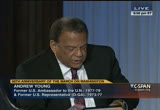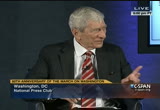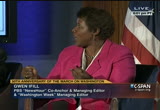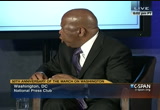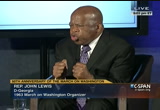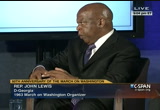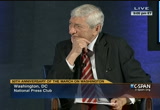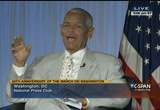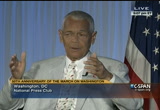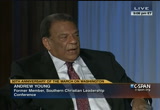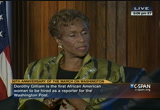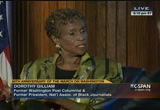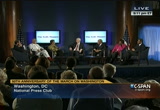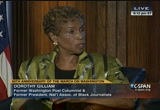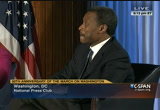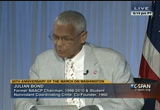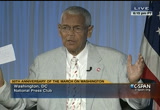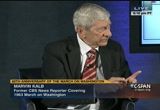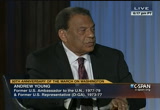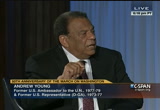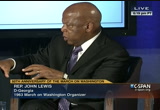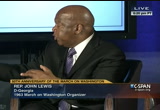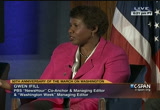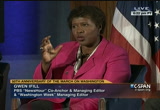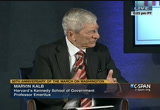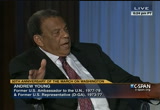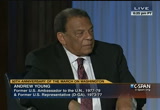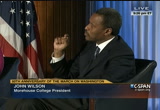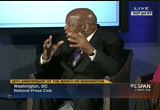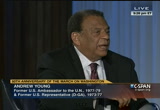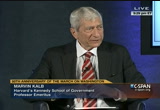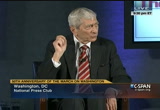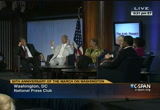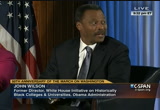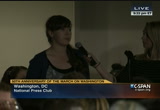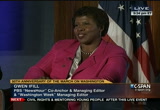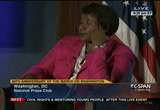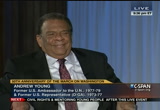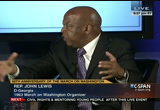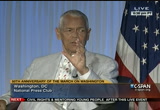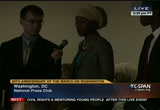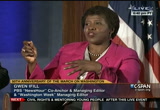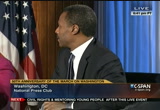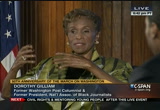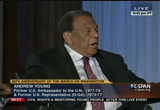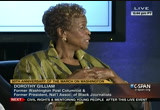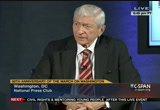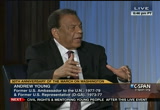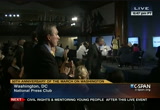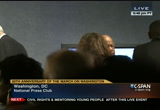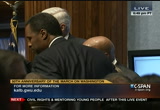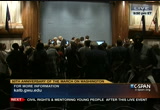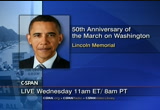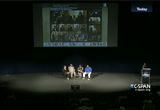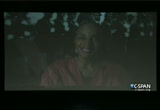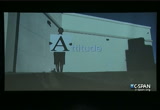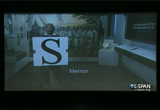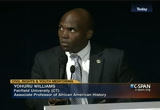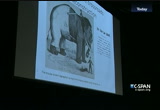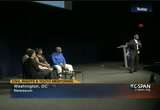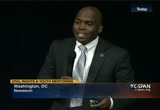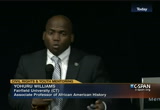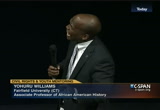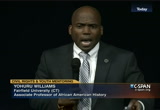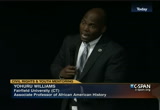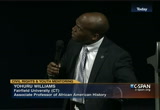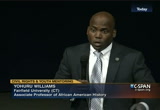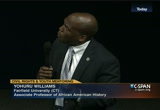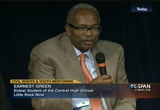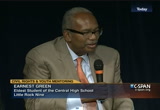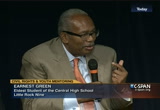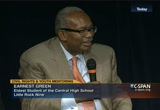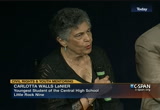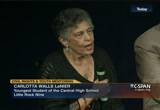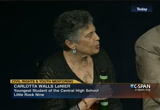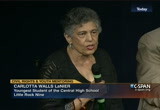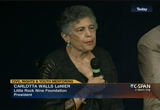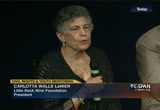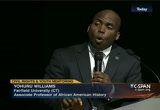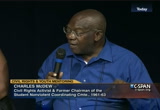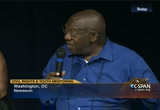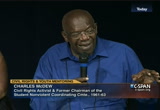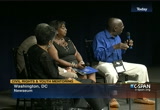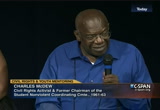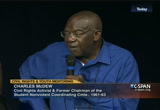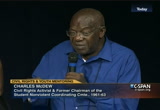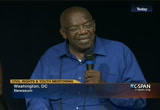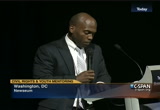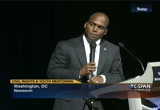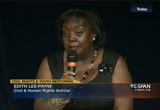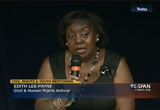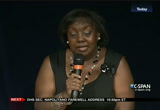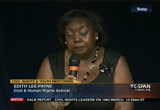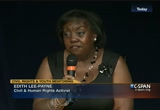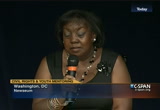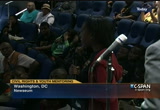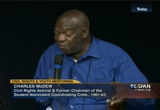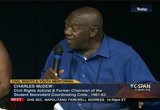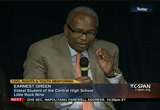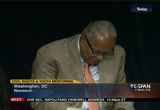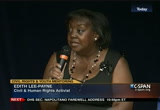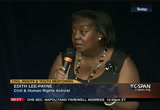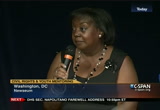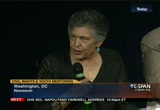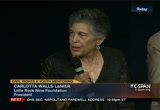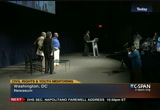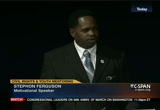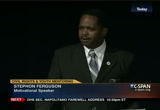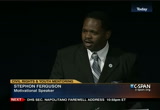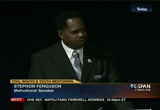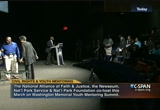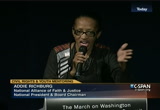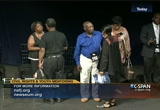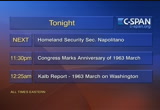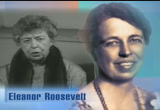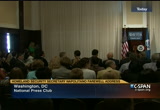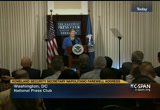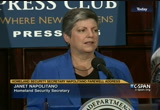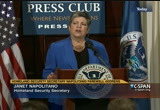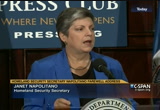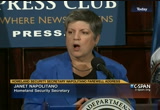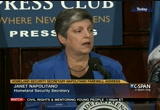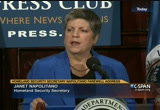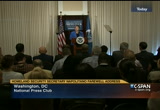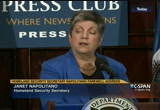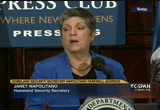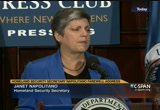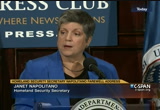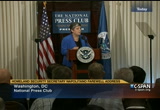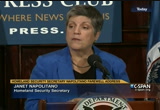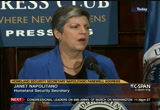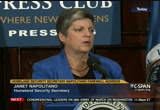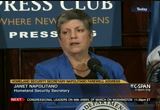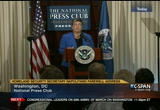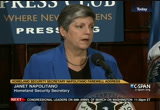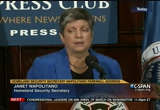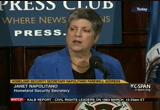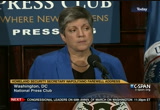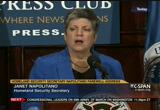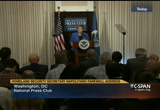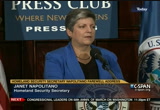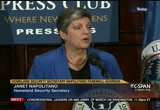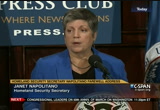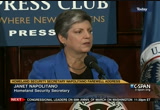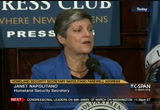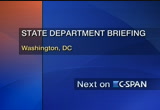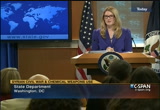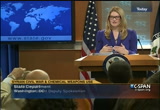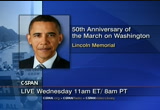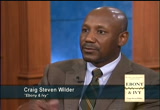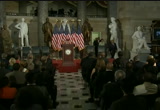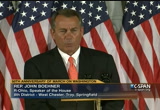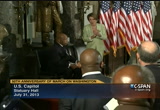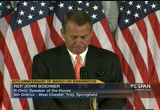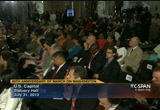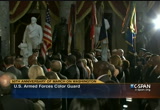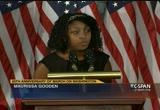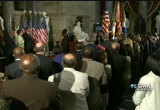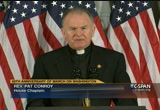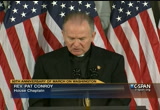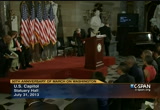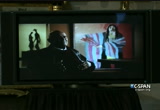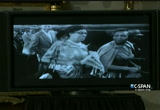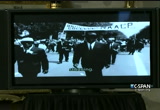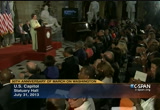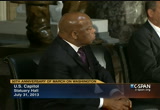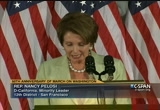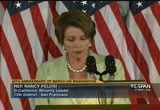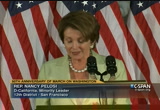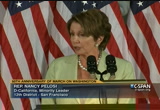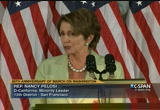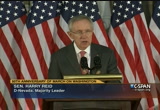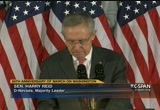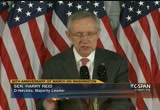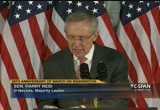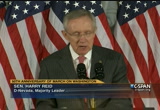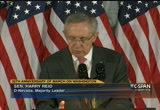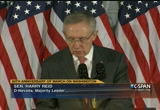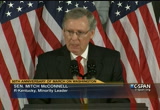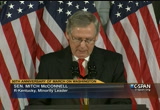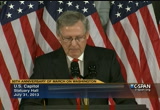tv Capitol Hill Hearings CSPAN August 27, 2013 9:00pm-12:01am EDT
9:00 pm
-- this note was a promise that all men, black men as well as white men, would be guaranteed the inalienable rights of life, liberty and the pursuit of happiness. it is obvious today that america has defaulted on this promissory note insofar as the citizens of color are concerned. this, theyhonoring have given the negro a bad check marked insufficient funds. that was totally ignored by the press. that was the message of jobs and freedom. that is still the message. >> if i could just -- >> i want to take a minute to remind our radio and television isiences that this remembering the march, the movement, and the dream of congressman john lewis, julian
9:01 pm
bond, andrew young, gwen eiffel -- ifill, and dorothy gilliam. >> to pick up on what and a young just said, let me put on my reporter hat for a minute, over the years when most people think about the march on washington they only think about the dream speech and that part of the speech. they don't think about anything else and you are right. he said a lot harsher things than anyone talked about. this is including the absence of women on the stage on purpose. they even missed the dream part of the speech. they were looking so much for the violence that they did not see it. i'm wondering how they thought, with anyen there,
9:02 pm
notice that they've missed the story. >> i want to address media coverage on the march on washington and i remember the three major networks were there. withoutered it interruption and they broadcasted it to europe. "the washington post" assign more than 60 reporters to cover that story. it was really big news. a congressman, you said that the civil rights movement without the media would be like a bird without wings. what did you mean? >> i meant that. >> i know you did, but tell us what you meant. without the media, especially in the american south, without reporters, without the photographer, without the cameras to bring the message
9:03 pm
.nto the living rooms >> how did you get that in your -- how did you get that in your head? we had a protest and a demonstration. we knew that we had to do it at the same time, to make the the 6:00,ws, to be on six 30 p.m., seven :00, 10:00, 11:00. -- 6:30 p.m., 7:00 p.m. they were just sitting there orderly reading a book, looking straight ahead. and then well-dressed
9:04 pm
you had the other element that would come up and pour hot water on us, the other elements, the racist elements. people saw the contrast. in birmingham, using dogs on young children. the american people could not take it. were saying to the mustess, to members, you do something. that is why president kennedy called that meeting in june 1963 and he spoke up and said, mr. president, the black marchers are restless and we're going to march on washington and president kennedy started moving around in his chair. he did not like the idea. if you bring all these people to washington, won't there be violence, chaos, disorder? mr. randolph, he responded, orderly, been
9:05 pm
peaceful, nonviolent protests and we spoke to the media and we had a productive meeting with the president. we told him we were going to march on washington and a few 1963, we metuly 2, in new york city at the roosevelt hotel and in that meeting, we invited four major white religious and labor leaders to join us to call for the march on washington. without the media, the movement would not have succeeded. we needed the press. we came of age with many of the yet other reporters. actually worked with the national council of churches and had a program on cbs in 1957 called "look up and live." they gave me 60 seconds introduction and a 92nd conclusion and the one thing
9:06 pm
that is hard for a preacher to learn is to express something in .0 seconds i was not the press secretary, but because i had worked with looked up and live, i was always on this. if you're going to make it on the news, you have to make it short. told him that when he went to the march. look. if it's a 10 minute speech you get news coverage. if it's an hour, nobody will touch it. it is a hard lesson to learn. i remember the telephone number of the associated press in d.c. i've forgotten it again. overy, ask me when this is and i will tell you. >> martin luther king seemed to have a special appreciation of the pervasive power of the media
9:07 pm
and am wondering how he got it. >> i really don't know, but his genius was he was able to talk to white and black southerners in the common language of the evangelical christianity and know that both of his audiences would understand what you saying, the references he was making, the things he was talking about, and he had this ability which many people do not have to talk to these different groups of people and make them understand. the beauty on the march on washington and his speech was that he is speaking to this large number of white people who had never seen a black person an entire speech before. all of a sudden, here is this articulate man explaining why we are marching, why we are protesting, because we do not like the things that are going on. he made it so clear and so plain that you could not help but say, he is making a real argument here and i inc. he ought to be
9:08 pm
listened to. usee was making much more of the old testament and the new testament though. testament prophets, when he really got to preaching, he would talk about isaiah and jeremiah. the jewish rabbis and the jewish congregations. the whole narrative of freedom was we have been locked in the slavery of egypt and we had wandered around in the wilderness of segregation for 40 years and we were about to enter the promised land. christianity. that was judaism. and the jewish community was bombed in the south just like we were. africa sore in south that it was an ecumenical
9:09 pm
movement in the best sense of the word. in the presence of abram henschel on the front lines and , greek orthodox archbishop freedom rights struggle and not just a black struggle. >> dorothy, you worked for the black press corps covering a number of the hottest stories in the south. how was that different from post?g at the washington >> one major differences was the difference in resources we had a "the washington post". payables --smaller papers had unlimited resources but what they had, i worked for defender ine memphis and that allowed me to go over and be a part of a
9:10 pm
coverage of the little rock nine. the editor of the paper was beaten while he was trying to cover that story because they mistook him as a parent. he told the rookies to stay on the office but obviously when he was beaten, i went to little rock. we were the staff, you know? that was one of the major differences. the important thing about the black press is that they told the story before the daily press got there. once i arrived at "the impressed post," very by the resources but one of the major things that was missing was enough diversity in the daily press to really help to tell the story of communities and those stories well. >> forgive me if this is a mean
9:11 pm
question. you are talking about the resources of ""the washington post"." they had had 60 reporters covering the march on washington and yet the following day, august 29, 1963, and "the washington post," no mention of martin luther king nor of this speech. you were there. i know you were not covering there. you were there as a spectator. what is your understanding? what was that all about? and tryingstanding to piece it together afterwards, first of all, the focus within the media was on the violence. when i spoke to some of the reporters, the editors were giving battle plans of what to do in case of violence, how to look for bad guys. if any reporters got hurt, how do we get together to get the reporters out?
9:12 pm
the whole focus was on violence and there was no violence. >> it was a rather great speech. >> i'm coming to that. [laughter] if there had been a black editor among the people making the do not want to knock my old paper because i love the people who run it, but the fact is that there were three black people on the whole staff and none of them decision- makers. i was on maternity leave and the other two men i'm sure were part of the coverage, but when newspapers make decisions and people sit around the table and talk about what the news is, what goes on page one, what goes on the inside, i think it had there been more diversity around the table where someone could have spoken the importance of
9:13 pm
that speech -- >> that remains true today, too. it's a problem. you talk about how terrible it was in 1960 three but newsrooms are not that much more diverse now especially when it comes to decision-makers. sensitivity to see the story no matter what it is as it unfolds around them. bottom line is there was a decision made there as there are decisions made now about what is fit to print. someone made a decision in 63 about whether that was fit to print. if it was not worthy of the attention and they recently apologized for that. reason decisions are made is because you need more people around the table. the reason that is relevant, to pick up on your earlier point about the 50 years and about was of the things dr. king
9:14 pm
really demanding, such as an end to poverty, etc. at this moment, as our country gets browner, the media gets wider. we are losing the diversity within the media right now. right now, there are only about the press of color in today. that includes asian americans, latinos, native americans, african americans. >> let me read something about the preparations made for the march and you will see these racist notions of what black people will do if they gather together -- >> this is not terribly long? >> trust me. the areaive surgery in was canceled freeing 350 beds related room -- emergencies. they worked 18 hour overtime
9:15 pm
shifts instead of the normal eight hours. in the event of a riot, they would be stationed on every street corner in downtown washington's business the street to guard against looters and they deployed 86 motorcycles, 20 jeeps, police helicopters, cranes to move broken down or disabled buses and they were placed on around-the-clock standby. inmates werel -- evacuated to provide space for disruptive protesters and national guardsmen were sworn in and given temporary arrest powers. they made over 100 doctors and nurses available. liquor sales were banned for the first time since prohibition, and there is more. >> baseball games were canceled. >> two baseball games. black people as troublemakers. you cannot have them gather together and they are bringing thousands at a time. what a terrible thing that would be.
9:16 pm
>> andrew young, i want to ask you this question. or on the 40th anniversary of the civil rights kentucky, theon, newspaper there, the front page had the following. it has come to the editors attention that the herald leader did to cover the civil rights movement. .e regret the omission taking point,a what was your judgment? you had touched on it earlier, the white coverage of the civil rights movement. i remember that there was a very between difference local television coverage and network coverage, that if you were in the south and you are watching the local news first and then the network news, you
9:17 pm
would see two different types of coverage. the local news was extremely sympathetic to the white end of the argument and the networks ofan to pick up the message the civil rights movement but it was two things. i'm wondering from your experience, did you come upon this? >> all the time. one of the reasons why we did not mind the act that we were bogged was that we wanted people to know actually what we were .oing and saying a lot of the press and clearly the new york times and the washington post, a lot of them were getting their tips from the fbi and the gb i. once we got past 63 and 64 in saint augustine when the mob turned on the press and in mississippi when people like all good got fired by abc because he would not cover --
9:18 pm
abc was still running the story, forgive me, that these three civil rights workers were hiding to get attention and he knew that they had been killed. he lost his job over that. i had to pull nelson at and out of a mob in saint augustine to keep them from being enough. a danish reporter got hit in the camera either by a baseball at and knocked his eye socket out. it was ruthless and brutal for the press. press.s the national the written press never quite believed what they saw. to have press conferences at 9:00 in the morning to say what we were going to do and then the
9:19 pm
demonstrations would start around 1030 and that 1:00, we would tell them what we did, why we did it, and we would answer questions but they would still -- they could not believe that martin luther king was as , as much of aent selfless man that he actually was. >> in 1961, may 20, when we arrived in montgomery during the freedom ride at the greyhound bus station, the police department withdrew and they were someplace else. they just did not show up. an angry mob met the bus and the first people to get near the bus were members of the press and he is reporters were just beaten, just bloody. cameras destroyed.
9:20 pm
i can remember the names of some of the individuals and i got to know them very well. beat the members of the press they turned on us. you come to selma 1965. i recall the name of a major newspaper or even apologized and they all feel sorry that they did not cover the march from selma to montgomery. this major newspaper is located right in the heart of the south. the publisher and the editors said it was the worst mistake as an editor and the publisher. but itd not cover that took "the new york times," newsweek, cbs. cbs, you had a wonderful photographer, lawrence peers. >> fearless.
9:21 pm
>> he carried a gun. he was shooting a great deal for walter cronkite. quick shooting a film. [laughter] >> laurent said on one occasion, if one of them even touch my camera, -- >> he was a southerner. >> he was from montgomery and he had been with martin from the beginning. judgment ons your how well did the american media do the coverage of the civil rights movement. >> there is a great book called the race meet in which they tell a lot of these stories and they admit some of the things they missed. these were the big newspapers and there's another book written a few years ago by jack nelson who worked for the los angeles times for many years.
9:22 pm
he very honest but talks about how he didn't see it erie it he did not see the story and how he turned and began to realize that anest as a reporter that it's great story and then as a person. there were a lot of mistakes was but i think a lot of it not willful blindness as much as it was a lack of exposure among southerners and northerners. among the northerners it was like, really, is this happening? is this important? the genius of the civil rights movement is knowing then and now how to get our attention and by staging sit and's, arrests, doing what would get them on the evening news and then they could not look away. that is when these events begin to happen, when he saw with your own eyes the hoses turning on the children. it is like watching young children who are the victims of chemical weapons and serious and
9:23 pm
it changes hearts and minds. >> these images were also shown around the world them that was also a major influence on this government. ninethe little rock f were integrating and my old editor from the tri-state defender alex wilson was beat in -- beaten, is picture was on the front page of a newspaper in russia. >> i'm told that president johnson and dr. king would this matter of getting on the news and how, if a demonstration, not through any fault of the demonstrators turned violent, how you would take the incident and make sure that it got on the news. is that your understanding of what the two were talking about? may be in a much better position to answer that but it's heunderstanding that after
9:24 pm
received the nobel peace prize he came back to america, had a meeting with president johnson and said, we need a voting rights act and president johnson said, dr. king, we don't have the votes in the congress. i just signed the civil rights act. he said, you make me do it. joined us in selma and coming out of the white house, we did not get in until 7:00 at night. he waited until the press had gone home. of there around 930 in the president's final words were that the president does not have as much power as you think he does. introduce voting rights legislation. when we went down that road for the west wing i said, well what do you think?
9:25 pm
got to, i think we've figure out a way to get this president some power. [laughter] seriously. >> was that going to be done through the media? mandate thatoral he did not have the slightest idea. about three or four days later, a lady by the name of amelia boynton came from selma and talk to them about the fact that they naacpot havean emancipation day service because jim clark would not let them have mass meetings, political meetings and churches. >> he was the sheriff. he was very mean, a vicious man. let her bury her
9:26 pm
husband in a church because he had been to political. , this is whered we are going. >> we are rapidly running out of time and i do have a concluding question and i would be most grateful for a quick answer from each of you. i will start with dr. wilson. what is the most important thing that young people, and there are many young people in this audience, what is it that they ought to know and remember, hold dear to their hearts, about the march on washington? it wasreal purpose of jobs, but what was behind that emma i think, and what was a revelation for me was how much there was a sub stratus and everything that dr. king did, .eally all about education he was really locked in on that and in fact, when the small group went into the white house
9:27 pm
to talk to the president, president kennedy said, and this that with the kind of influence you have in the black community, you really ought to emphasize schools and getting your kids to do well in school. >> i am mostly struck by how different things are now. the technology is such that you can get it -- mob to show up and dance in the middle of pennsylvania avenue if you wanted but to get 253,000 people against the mall, there would be old horns, pulpits, it was remarkable and to me, i would like for young people to understand the enormity of what it took to do that. >> and a very short time, a group of people came together because they believed in something and they put together the most unbelievable moment in american history.
9:28 pm
>> for the legacy on the march in washington to go or word, to the young people who want to be see thatts, to really they have an obligation to cover poverty, cover race, go deeper to find the real story. >> julian. >> we are missing the pbs video documentary on the march tonight because we have to be here. >> but it will be online. [laughter] the march,came to ordinary men and women dressed like they're going to church because many believe they were going to church. >> andrew. >> the world came together around an idea that all men and we soon added women and children, gay, lesbian, all created equal and that it created a human rights movement. >> i'm terribly sorry to say but time is up and i want to say
9:29 pm
thanks to everyone in this packed auditorium. i want to say thanks to all of you on the internet, radio and television. thank you to our splendid panelists and i want to say king you to martin luther who wrote from a jail in birmingham alabama 50 years ago words that applied then and apply with equal power today. injustice anywhere is a threat to justice everywhere. an inescapablen network of mutuality tied in a .ingle garment of destiny whatever affects one directly affects all indirectly. he was right. when i covered the march 5 years ago, i felt like i was involved in something much larger, much more important than a new story. it was a huge moment in american
9:30 pm
history. that is it for now. i am marvin kalb. as edward murrow used to say, good night and good luck. [captions copyright national cable satellite corp. 2013] [captioning performed by national captioning institute] >> ladies and gentlemen, this is your opportunity to ask our panelists. we have set aside the team and it's for that purpose and there are microphones on both sides. if you have a question, i would appreciate it if you'd direct it at one of the panelists and make it a question and do it quickly. i will start with, if i can see somebody there -- hello? anybody on either side?
9:31 pm
where? >> right here. click speak up. here in the city. bond former student of mr. in charlottesville and a former colleague of gwen's at nbc. gain coveredvement and taught in schools today? is again for all of you, a doctor legacy -- is dr. king's legacy reduced to the speech he made on the 28th or could it act go in a letter from a birmingham -- could it echo? >> would like to answer that? >> the southern poverty law how civillooking on rights is being taught and it is not surprisingly found that if you look at the states with the biggest black population, they are most likely to teach about civil rights. i do not know if this is because of the black people in their
9:32 pm
states or they realize these people want to know about themselves. and then, they have realized we .ave made a big mistake all and to be taught in now north carolina has become the new mississippi now. mississippi lost its place. answeredt someone else the next question. that is one of my students and a bright young man. >> the story itself, the tradition is alive and well at morehouse college for sure and we are going online with some things, converging via pretties, the brainpower that we need. we have one of our professors and a morehouse grad here at winston now. couple of things that happened
9:33 pm
in this country recently, the monument here in washington, that was about $120 million and the king civil rights museum in atlanta and here is morehouse college who built a chapel in 1979 with a statue out front. we think we need to converge reallysources to undergird this tradition, this king tradition at morehouse and that is what we are going to do. >> i had the honor of working with marvin at the brookings institution previously. my question came up earlier and i think you mentioned it, regarding the role of women in the civil rights movement and their presence at the march. i'm just wondering if you could speak a little bit about that and the role of women in civil rights and other equality move it's moving or word. of a travesty. it's not as if there were no there were a lot.
9:34 pm
the women are the foot soldiers, the ones who keep the church open. that used to be the case, but in this case i have asked several people in reporting about where the women were that day because there were no women speakers. the only one scheduled to speak was late because of a transportation snafu and did not there. as a result,, there was no one speaking. the closest was when jackson said, tell them about the dream, martin. that is the closest. in 1960 three, as eleanor holmes norton told me, this was pre-feminism. they were not seen to be a part of the public eye. the marchowever, sparked other kinds of movements movement the feminism
9:35 pm
of the 1960's and 1970's and other movements as well. the took center stage as days go on. >> josephine baker did speak out in march and mr. randolph asked all the participants to leave town that night. dorothy heitz said she was not leaving and she convened a meeting of women the next day and some of the seeds of the feminist movement were so there. >> you also have to remember that it was a group of women who got behind rosa parks. the montgomery bus boycott was university women from testing the end alabama state university that had gone through several trials of bus boycotts that did not work before rosa parks came in. amelia boynton. 1929 as ao selma in 19-year-old sent there by george
9:36 pm
washington carver. still in 1965 inviting dr. king. she is now 103 years old and she led a get out the vote rally for barack obama and the last election in the back of a car. [applause] was sitting in the back of a convertible and she registered in 1932, the year i was born. sharp,still alert, still and nobody knows her name. i cussed out her sorority sisters because they introduced her and gave her an honor for being a sorority member for 50 years and did not know who she was. women, it's your fault. [laughter] >> a question here on the left.
9:37 pm
>> if martin luther king and i had not married little country from terry county, alabama, you never would have heard our names. all three of their wives came out of the black belt of alabama. women have never, ever receive south,dit all across the all across america. even here in cambridge, maryland , gloria richardson. in nashville, tennessee, a young diane nashe name of who called a meeting to organize the student nonviolent organizing community. fromat about daisy bates the little rock nine? she counseled them. >> and yet they still were not on stage.
9:38 pm
woman by the name of joann robinson who was a professor at alabama state college long before martin luther king jr. and others did anything. she took old memory graph machines and made hundreds and thousands of copies of a leaflet and had students from her school to go out. there any discussion about the absence of women on that day? >> the movement was dominated in the early days by ministers, black ministers, lots of them baptist. they were just operating in their own church. >> there is a book about the march on washington just published. history of women in the labor movement who did much of the work before the march on washington in making it possible.
9:39 pm
it's a wonderful read. jones.iam p >> we got a bad review in the new york times but don't believe that. >> i'm a third-year student at gw law school and it's an honor to be in the presence of such great leaders. theuestion has to do with media and the current coverage of the black community. sometimes it seems as though there is a disregard for the problems that affect black people and the leaders who are working to resolve some of those problems but at the same time highlighting more the negative aspect of our community so that the only narrative we have is a negative one. do you feel as if imperative years ago there is a stagnation in terms of how the media covers? or do you think we have progressed so more of our issues are going to be covered. i saw that question barreling right towards me.
9:40 pm
i would actually like dorothy to as the formere president of the national association of black journalists, it is given a lot of thought and putting in a lot of muscle behind this very issue of our representation in the news media. frankly, i think we are better than we were. thatll stick by the idea we have to be represented in the newsroom and we have to see the stories in front of us. all crippled, hampered, whatever experiences we have in life so unless you have a newsroom that as a people with righty of experiences, there's not going to be kind of coverage. i don't necessarily think there is only negativity covered but i do think, as we saw in the coverage of the march on washington that when there is conflict, that is where the cameras will go. be a there is going to fight, heat, we're going to pay more attention and for longer
9:41 pm
time. if it's a trial, we will cover it. that is the post-o.j. experience on cable television but i still think there are so many more platforms that exist other than newspapers, which are fading in order for us to get information. i can click on blogs right now that would tell me in more things about what's going on in the african-american community than i could have ever found out five years ago. areuse of technology there lots more places to get the information but it is just not as broad. it is deeper. reverend al sharpton has his own show. maddow -- there is one. >> that's not journalism. talking about journalism, not activism, which is different, to me. really is a difference
9:42 pm
between fox and msnbc and you really have the feeling with that there was a solid middle, even in the south. columns and the problem was 700 of them were about race relations. there is nobody doing that in depth column in any journal that i know about right now. as to what glenn has said, the responsibility for covering stories of race and poverty really continues. way mediand the works, of course, and we follow what we think when we think there is a problem. especially in terms of poverty when you have a katrina or some issue, there is a barrage of stories.
9:43 pm
there are a lot of disturbing trends that should be covered. good representation for me. the majority of the bodies counted in the flood were white. they covered it as a black problem. because the whites were living in the swamps around the city dome.e blacks got to the but the bodies floating down the river were white. it was really really shallow reporting that we all contributed to and it made it a was they because there story of nobody caring about infrastructure development of the american people in the mississippi valley and they made it a black story about poverty. build on that, i think the
9:44 pm
idea is reporters of all stripes really have a responsibility to write about these issues and i think part of the challenge is to use creativity to realize that as the expanding wealth gap, it is a big story affecting people's lives and we keep hearing about it but we do not hear many of the real human stories. especially with young people who, i think are more sensitive in many ways than the masse 50 years ago excluding the great people who covered the civil rights .ovement area i we need each young arson him as a journalist to be sensitized to what they do. >> and curious. person as each young a journalist to be sensitized. you can win yourself a pulitzer
9:45 pm
prize by doing so. fifthemember this advice tee and 60 years ago and it's the same advice. we are running out of time, that's a fact. one more question on the right. i apologize to the rest of you. >> good evening. my name is ed hayes and i am the mand father of a morehouse who also works for umc, a show sponsor. one outcome of the march was significant legislation, significant civil rights legislation from a difficult congress. now as we come together, it is soon after the voting rights act has been neutered and we had a wonderful march last friday and we will have another -- we must have a question. >> what do you think we can get out of this congress after the march? >> we have one good congressman right here. go ahead. >> you must never give up, give
9:46 pm
help landst optimistic. i think we will get something, maybe not anything comparing to the congress back in 1964 and 1965 but you cannot give up dr. martin luther king. we must help land off a mystic. you must do something. went to congress when 27 others opposed the war in vietnam and in the next congress, we stopped the funding . what i think is going to happen in 2014 is women are going to realize that the nonsense in the areemes in both parties canceling them out and you're going to have a gathering, an increase of women running in the bedle and there will democrat and republican, but different than the ones you've got in congress now.
9:47 pm
i think we are going to have a white woman senator from georgia and maybe two more white women congressman. we already have five black congressman from georgia. this repression is making people mad and getting them organized and it will help us in 2014. >> it also requires action. this gives me a chance to plug this. we are interviewing the president and we will be asking him that. [applause] think that's a wonderful way of closing and i want to thank every single panelist. i have been honored to be on this panel with you and i thank you for being with us. all of you, thank you very much and good night. [applause] >> ladies and gentlemen, thank you for joining us tonight as the march,ember as
9:48 pm
the movement, and the train. we are all called to continue our critical dialogue. panel, to thank our congressman john lewis, naacpador andrew young, chairman emeritus julian bond, and wilson, dorothy gilliam gwen ifill. calendars for the next program, friday evening november 22 when dan rather joins marvin of ther the reflection 50th anniversary of the passing of john f. kennedy. inks again. drive carefully. good night. -- thanks again. drive carefully. good night.
9:51 pm
9:52 pm
king, junior -- of dr. martin luther king, junior. it begins at 11 a clock. now a discussion of civil rights and mentoring young people. called little rock nine, african-american students denied access to central access -- high school to little rock, arkansas and the national alliance of faith and justice, newseum cohosting this hour- long event. >> again, thank you for your patience as we transition the group back. is aont of you today living story of history.
9:53 pm
seepportunity for us to what many of us have seen in and someone whose stories have helped to influence our lives and as someone who we, as a quick psa, rephrase those who help shape a journey to greatness. you take a moment now to view this short clip which sets into motion our session this afternoon, a journey to greatness.
9:54 pm
>> we all know about famous men with goals. >> less well known, is the hundreds of civilians who died. their sacrifice helped desegregate the united states navy. >> rosie the riveter, a symbol of gender equality. >> she changed american society forever. >> frederick douglass once said it is easier to build great children than to repair broken man. >> the trials and triumphs of those who sat at the lunch counters in birmingham in 1963.
9:55 pm
those who inspired the formation of the student nonviolent committee. >> those who cap the dream of freedom alive for countless enslaved who traveled on the underground railroad freedom. like my ancestor who traveled north to liberation. >> that was for all. the concept of men like dr. martin luther king jr. and many others stood for and died for. >> selfishness or service to the community? which journey will you take? to struggle to choose penitentiary or greatness. >> we have greatness to discover. >> i want to be great. >> i want to be great. >> i want to be great.
9:56 pm
>> how do use l greatness -- how do you spell greatness? ♪ [applause] >> good afternoon everyone. we are going to get started with our program this afternoon. very briefly, we will reverse the order and put the powerpoint up very quickly. before i introduce the panel, i do want to share with you a few thoughts on greatness. we are fortunate this afternoon to hear from a number of impressive speakers who shared
9:57 pm
their -- with you their experiences. i want to frame this panel of impressive people who sit before you. the thing i want to press upon you is that you are the giants, but you must learn from giants to be a giant. if you want to learn a vehicle, you must have someone teach you. you must learn from others. we talk about empowering yourself, or assuming a role in the social justice movement, we want to focus on the fact that we have come a long way. this is a struggle that dates back to the civil war reconstruction. this image from the civil war embodies the problem that has beset america since 1865. what do you do with the 4.5 million people who were slaves? how do you achieve social justice for people of color?
9:58 pm
in 1855, frederick douglass was invited to the massachusetts antislavery society to give an address. the question that was posed to him was this, what shall we do with the negro? douglas is going to give a speech and what she's is going to foreshadow the 100 years -- in which he will foreshadow the next 100 years of american if you see him on his to -- this is 1865, 100 years before the brave men and women who stood before you
9:59 pm
empowered by brown versus board of education working to integrate the schools. understand this. leave him alone. if you see him at the dinner table, let him go. if you see him going to the ballot locks, let him alone. frederick douglass has outlined three of the major problems -- [applause] they are the cornerstones of what i called the six degrees of segregation. in 1865, frederick douglass was talking about housing, education, jim crowed justice and we are still battling housing, education, access to places of public accommodation. i would say that our struggle has not yet concluded. [applause] the dna, to look in the blueprint of our music and culture, think about stevie wonder's "living for the city."
10:00 pm
ways, it is a dialogue with frederick douglass, a boy is born in hard times mississippi surrounded by four walls. his parents give him love and >> we can read yet song and see that they are hobbled by lack of access to education and poor housing. when he comes to new york city, he is trapped by jim crow justice. we will not be able to see those parallels in frederick douglass theseephen wonder if struggles were not real. of human rights, we look at our latino brothers and sisters. do i look legal? we have to understand how those struggles impact our own struggle. it impacted the african-american community. it was applied to asian americans.
10:01 pm
it is an opportunity for us to appreciate what martin luther king said. help thoseed to dynamic women in montgomery and give them a speech about staying off the bosses. he had a phd from boston university and was giving that speech. he said that we are here in a specific sense because the bus situation in montgomery. we're here to get this corrected. listen to what king says. he said that the situation is not new. the problem has existed over endless years. for many years, negroes in montgomery and other areas have been of flick did with the paralysis of crippling fear. they havecasions, been humiliated and oppressed because they are negroes. he said something interesting to that audience, he said that i do
10:02 pm
not have time to go into the history of those numerous cases. secret, heyou know a could have gone into the history because he knew the history. he simply did not have time. i wanted to resurrect some images from that moment. these are some cartoons. philadelphia being insulted in the breakaway cars. this is from 1968. this shows a black woman being insulted. we talk about rosa parks and want to celebrate her. i want to tell you about elizabeth james who is not from 1865. arrested forwas refusing to give up her seat on a trolley car in new york city. we have a deposition. we'll read a few lines of it. driverup my hands to the ed he stopped the car.
10:03 pm
we got on the platform and the conductor told us to wait for the next car. i told him that i cannot wait. i was in a hurry. he told me that the other car had my people in it. it was appropriated for that purpose. i told him that i had no people. particular occasion. i was waiting to go to church and did not wish to be detained. young people do not wake up in the morning saying that i am going to make history. they wake up and say that they refuse to have their civil rights violated. i believe in the principles of equal justice and human rights. i believe in human dignity. i live in equality of man. when you do that, greatness cons. ask ernest green. ask edith. they will all tell you that. know that they just made the movie 42. thatleft out the fact
10:04 pm
jackie robinson was segregated under jim crow laws. -- where ind with want to end with you today is with the words of lorraine hansberry. passage from walter lee younger that talked about the american dream. your dad is going to make a business transaction that will change all of our lives. one day, when you are 17 years old, i will pull the car up in the driveway, with white walls and no black tires. hello jefferson, how are you this evening. i will go inside and ruth will come downstairs. you will kiss each other and she will take my arm and we will see you sitting on the floor with a catalog of all of the grade schools in the world around you.
10:05 pm
i will say, it is her 17th birthday. what have you decided? come and what you want to be. whatever you want to be, you name it and i will hand you the wall. rain hansberry and said, this is not a negro play. this could be a play about anybody. >> i had not noticed the contradiction because i had been under the impression that negroes are people and ultimately, we desire the same things that other people want. stable families, stable communities, decent housing, freedom from oppression. freedom is not free. as you hear from our panel as is afternoon, you have to be willing to make this commitment to do that. you needmind you that to embrace your greatness. marion and williamson said it best.
10:06 pm
our deepest fear is not inadequacy without our deepest fear is being powerful beyond measure. that we are -- it is our lightness that worries us. who are you not to be? you are a child of god. you are not serving the world. there is nothing about shrinking so that other people will not feel insecure. we are all meant to shine as children. we are meant to manifest the voice of god that is within us. as we let our light shine, we are liberated from our own fear. our president liberates others. today, you will hear from four panelists who are going to share
10:07 pm
their own greatness with you and hopefully, you can bask in their your and embraced greatness. offers panelists is ernest green from little rock high school. he is recognized for the role that he played in desegregation. the question we put to mr. green is this, mr. green, as you look over your journey, as the eldest of the little rock nine, you had a successful career. how do you define leadership? that, as aa question i always point out to my colleagues who did a lot of sitting next to me that, i never thought that 53 years after graduating high school, i would still be trying to get out of it.
10:08 pm
there is no easy formula for leadership. us, we knew that we wanted to pursue the best education that little rock has to offer. did most ofas little rock and most of arkansas, that it would be relatively, and i use the word relatively, easy. because arkansas had integrated the medical schools and the buses have been desegregated. all that was done quietly. there had been other districts outside of little rock and northwest arkansas that had integrated right after the 54 decision. us ashe governor's idus his political ping-pong -- when
10:09 pm
rs governor decided to use , this political ping-pong is about a bigger issue than my graduating or getting out of the 10th grade. greatness, i have to relate part of a discussion of the had in the green room, greatness is something that is thrust upon you. you do not plan it. in fact, if you look around, people who try to pursue it falls and pre-plane on their face. i always say, no when the moment is coming and, hopefully, be prepared. -- having support
10:10 pm
support is important. we had close friends who did not think we were so crazy. --t i admire about this week and i attended the 63 march -- and i attended the 63 march -- one that i work for, president knewr, another one that i before he became president, bill clinton and, of course i'm of the third one is president obama . in my lifetime, that, that is a far reach from a kid from little rock. to say that you know three living american presidents. up, i was growing presidents were something on mount rushmore and i did not know they were human.
10:11 pm
>> you cannot clap louder for mr. green and that? than that? a question for you. how are your experiences as a young person in little rock? what insight can you give people today? what did you draw for courage? what sustains you when you thought you could not go on? why king you -- what can you offer young people? that the support ist we had from our parents what we were taught at home first and what was reinforced by the black teachers that we had a long with the community that we grew up when. -- in.
10:12 pm
they told us that we could do anything that we wanted to do. we needed to be in control of our own lives. education was the key to success. we believe that. i believe that today. , unfortunately, that we benefited from that upbringing that we had and i knew who i was. those that were usrorizing us and bullying i knewof its the same -- i was as good as the next person and it was their problem, not mine. they could not accept me. i knew that i had a right to be there.
10:13 pm
that right was given to me by brown versus board of education and that supreme court decision. gowas a no-brainer for me to to little rock central high school when i had the opportunity to sign the sheet of paper. that was access to better education. lots of my black teachers or were teachers. and didchers not have facilities to work as well as the white teachers did in central high school. they had twice as many books in the library and the laboratories were great. i like to tell the story that i wanted to be a doctor. class at dunbar us -- high school, two of
10:14 pm
stood around a poor frog trying to dissect it. there were two people working on a frog at the other high school. it was about having those things. getting to know who you are. be center. b focus. understand that you cannot -- be focused. understand that you can achieve anything that you put your mind to and do not let anyone else get in your way. that, eventually, there will be a black president in the white house. i did not think i would live to see it. i get. -- i have. it is there for the taking and takes education and getting all of that information that you can get and, and going as high as you possibly can.
10:15 pm
the other piece that we were was, they cannot take that away from you. they can take other things away from you. they cannot take what you learn from school, in those classrooms. leave the twitter alone. leave facebook alone. go to google and put some names in there and start learning more. [applause] [applause] have told this country and pushed this country in the right direction. i am saddened by the incarceration of our african- american men. about the black on black crime in our urban areas and communities. i think about ella baker who
10:16 pm
made that statement. until black men and black are really -- all of a sudden, i have forgotten the quote. sons stand up and get enraged when they are incarcerated. this is something we need to be enraged about, too. not there freedom is for us and that is having that --lly bothers me today that today, that we do not see how important it is to get all the education that we can possibly get and move on from there. it will take you to higher levels level. the similarities that we have -- i cannot not
10:17 pm
mention this. it stood out in my mind and was one of the reasons i went to central high school. or 12 years old when emmett till was murdered. i will never forget that. you will never forget trayvon martin. those are the sorts of things. [applause] martin,ing of trayvon mr. charles, you are part of a revolution and interrupted your education to join a committee. people forget about the philosophy. can you talk about what drove you and your peers to form that organization under the tutelage of elevator. -- ella baker. can you talk about some of the problems that carlotta spoke about? been writing my story
10:18 pm
10:19 pm
way about trayvon martin and i if nine or, i wonder 10 people who get together -- will do together to do something about it. they are thinking about it and carrying signs about it. that does very little. [applause] mades, unless that's is real.- that's made it has to be made flesh. as people fromr different parts of the country. we were all around the same age when we heard about emmett till. school and in high it was one of the things that drove us. join the first
10:20 pm
movement that was directly problemsith, um, the wherever they were. and change it out from one itmon interest -- it changed out from one common interest. ohio, wisconsin, all of us, that was the common thing that, that's bound us together. -- that bound us together. as i look and see so many signs about trayvon martin, i say, how you are going to get personr with the next
10:21 pm
carrying the sign and say, what can we do together to help the cause and move us forward? got created.ncc reactionut of a common to injustice and lack of freedom in our society. we have seen, with ernie and carlotta and the nine people who suck together and have done we watchedack then, that struggle. that this is -- emother -- mami
10:22 pm
till brought that back to chicago and had the foresight to put that ensure -- picture on the cover. of emmett picture till's body. it appeared on jet and i found camehat everyone else who and became my comrades were moved by the same thing. all of us came from different parts of the country in different worlds and that particular murder struck us because this was somebody our age. just as trayvon martin is somebody your age. realize that speaking about and carrying signs will not do
10:23 pm
anything. it has to be something. ok, we have a point that brings us together and we have to figure out what to do with this energy and his anger and this concern. how can we put our passions to use? -- out of that wanting to do something, remember that we all started with the citizens -- sit-ins. moved to developing an organization. the student nonviolent coordinating committee. i remember coming back from the which wasing of sncc, held in raleigh, north carolina.
10:24 pm
that was in 1960. we decided that we are going to do something. we didn't have a name. we just -- we said that we are going to do something. later, we became the student nonviolent for dating committee. committee.rdinating saidovernor of mississippi this is what is going to happen when they integrate schools. emmett till is the first of that. blood will flow industry's. -- in the streets. we were prepared to do something about it. it was not do something to get pissed off about and hold up some signs. we were going to do something that addressed that problem and
10:25 pm
we did. we formed an organization and a plan about doing stuff. -- i came back as a freshman in south carolina state college. i came back to campus and there ,as this guy that used to help help us. said, son, you mean that you are going to see yourself handling white folks nonviolently? >> we said, yes we are. how do you expect to rehabilitate those who have never been bilitated?
10:26 pm
-- i said, that is the real question. that is the real question. how do we rehabilitate that which is never been bilitated. the grand promise. how are we going to deal with these devils? >> it is a testament to what you accomplished. wallace who was swept in in 1963. how is the segregation working out for him? sncc.arles and carlottau and demonstrate that civil rights must be good for the body
10:27 pm
because you look amazing. you should be -- a lesson to all of you young people. get involved with civil rights and you will look beautiful for the rest of your life. amen to that? youth ine a symbol for that iconic picture. message to young people today. i told you she was beautiful. take a look. two questions. what compelled you to march that they? -- day? what should compel young people in the present moment? >> the reason i attended the ago was because my mother understood that we
10:28 pm
lived in the north in detroit michigan, where i live now. she and i knew, from reading different obligations, like jet , about newspaper different disturbances in the south. remember seeing the picture of major adverse, after he had been killed -- medger evers after he had been killed. i went to integrated schools and lived in a integrated neighborhood. my friends were white and black, all through school. it disturbs my mother and me that people in the south had problems and could not live the life that i lived.
10:29 pm
they went to lunch counters and took public transportation. we would get on the bus. ride wherever we need to go and sat wherever we want to set. -- sit. coming to the march meant supporting the travesties that were happening in the south. just my mother and i. 250,000 people felt the same way. many who watched from their tvs and homes. it felt the same way and could not get there. thatew and understood america is a democracy and they're supposed to be freedom. there is not freedom. we have to unite and stand
10:30 pm
together as a child, i was 12 .ears old you can do the math. i knew that i had a voice. i knew that standing there with all those people was making a signs.nt they carried there were a lot of signs. it did not and august 28, 1963. it was not about putting the sign down and getting back on the bus, getting in your car, and going home. the voices continued. the stands continued. when there was demonstrations, that wouldchildren stand and make their presence
10:31 pm
meant theyif it might be beaten or they might be arrested. they had to do it and because they did it, people were able to go to school like these two members of the little rock nine in other places in the south. it is an ongoing process that does not and. you do not talk about it today and what happened with trayvon martin. we remind ourselves of how unfortunate it was. we do not want it to happen because we still wear hoodies. i wear them. my grandchildren wear them. we want that kind of thing to stop so what we have to do now
10:32 pm
is take a stand and use your voice. you have a right to exercise it. more important he when you exercise it you do it respectfully. that is what happened, that is the way we did things in the 1960s, that is what nonviolence meant even if you are mistreated in the process as dr. king was and i'm sure you have seen evidence of that in history books even -- either in reading it or saying it on tv. he came back day after day. many people came back day after day until the change came. that is what i would encourage you to do. it may not be easy. the 1960s, people were people of faith. .hey knew it would get better they did not win -- did not know when but they knew it would get better.
10:33 pm
you do not give up. you have determination, you have perseverance just like you do in school when you meet challenges in your classes, you do not give up. you keep a c, trying, you speak up, you do what you have to do. that is why we have been able to advance to where we have 50 ago. later from 50 years we still have a long way to go. as you can tell from the four of us sitting here, we have more use kindness than in front of us and as we look at you and my you have more years in front of you than behind you. and we need you to pick up the mantle and do what needs to be done to make it better for those coming behind you as well as for yourself.
10:34 pm
[applause] for one or twoe questions. any students that want to pose a question, do not miss your opportunity to glean knowledge from these people. any students that have questions for the panel? did i miss your opportunity. right there. we will do this opera style to save time. >> did you ever feel like you were scared, were you scared when you decided to protest, what drove you to keep it going and who was your motivation to keep going? and even though you that you could get hurt and all that other danger stuff. >> great question.
10:35 pm
>> is -- if you ain't scared, you do not know what is going on. because there's something certainly that you should be afraid of. afraid -- wed be went home -- a lot of black guys died and homes were armed. you had justifiable reasons to be afraid.you will need tobut you knew that your brothers and sisters felt the same way and were going ahead with the same dangers. we faced a common danger. there was no place where it was
10:36 pm
going to be easy. andso you swallowed hard you accepted the challenge before you. our songs would speak of anger not let no one turned me around. gonna let no one turned me around. decided from the very getting that we were going to do something about this even if it is going to cause some of us our us our lives.f we understood there was a blood price to pay and we would probably pay it. that you do not
10:37 pm
start out expecting to die. that is not the motivator that takes you through the effort. but you realize our history is one in which a lot of people hated the price for -- paid a deep rice for our liberation. price for our liberation. us to quit. they wanted you to back down. they wanted you to go back wherever they thought you were to go back to. moment you decided that you are going to stick it out, ,rying to do the best you can whether it was sncc or the little rock nine, we were going
10:38 pm
to show that we belong to their -- belonged there and you were going to have to get used to a new order, a new climate, a changing world, and we wanted to be part of it. that has been the thread that sustained us from the first slaves i got off the boat in 16 -- that got off the boat in 1619 in jamestown. for young -- you young people, it is what we expect you to do, your best. not so for mediocrity. not let the crowd determine who and what you are. and be willing to take a stand and stand up for principle. >> lipstick another question. -- let's take another question. >> after 50 years following the
10:39 pm
march to you believe the dream has come into reality? >> great question. >> after 50 years, part of the dream has been realized, but we're not there yet. we're not there yet primarily because we made great strides with reverend dr. martin luther king as a leader. leadership is what is needed but also there needs to be good followers and there were good followers. dr. king.d alongside we had an excellent president. i am not taking anything away from his leadership. but because we just had a supreme court decision that somewhat reversed the voting rights act that was on the table 50 years ago for people to have the right to vote them a -- to have the right to vote, that needs to be taken care of.
10:40 pm
[applause] that is something that the dream that went backwards and now we have to bring it back. and so while you have instagram i know you don't use facebook anymore because i do. you have the ability. 50 years ago we did not have social networking. 250,000 people had only telephones. and party lines. but they came. people converged on washington because of trayvon martin. because of the supreme court decision. us really do of want healthcare. we want that. we need that.
10:41 pm
so if you tweeted to all the people you know and we need to just like john lewis and martin luther king, all of them said this is what we need to do and they did it. if you all did that and your parents did that and your friends do that, there is no reason why there could not be one million people. what do you think congress would do if they saw one million people in washington? [applause] that is how you make a difference. that is how you do it. that is how you make that dream happen. >> one last question.
10:42 pm
>> my question to one of you guys are all of you guys. you know some kids including myself, we witness a lot of discrimination during school. my question is, how did you guys cope and deal with it on a daily basis? earlier am a -- >> as i said earlier, you'd do need to know what you cannot come push and yet centered. with that, you can do almost anything you put your mind to. just to get back on some of the things that have been said in regard to that, my home was bombed. while i was at little rock central high school. i got up the very next morning
10:43 pm
and went to school because i did not want them to think that they had one. -- had won. all right? [applause] the other pieces that even through all the adversity that for the yearh, 1957 and 1958 and not being about to go to school in 1958 and 1959 because the government closed the school, i went back in 1959 and graduated in 1960. i needed that diploma to validate all the things i had gone through. i really knew who i was. i have taken that from there to go ahead and do whatever i need to do. i do not need a lot of people to validate me in a sense. i need to know within who i am. i think if you get to know who you are, maybe -- the world is
10:44 pm
out there for you. be part of that will for society. be part of that hole for society. -- be part of that whole for soc iety. please give a hand to our panel. [applause] >> you want to be important, wonderful. if you want to be recognized, wonderful. if you want to be great among wonderful. but recognize that he who is greatest among you shall be your servant, and that is the new definition of greatness.
10:45 pm
this afternoon, the thing that i like about it is that by giving that definition, it means that everybody can be great. because everybody can serve. you do not have to have a college degree to serve. you do not have to make your subject and your verb agree to serve. you do not have to know about lehto and aristotle to serve. aristotle to serve. you do not have to know einstein's theory of relativity or the secondary of thermodynamics and physics to serve. you only need a heart full of soul generated by love, and you can be that servant. i know a man, and i just want to moment, andim a maybe you will discover who i am
10:46 pm
talking about as i go down the way. he was a great one. he went about surfing. he was born in an obscure child of a poor peasant woman, and yet he grew up in an obscure village where he worked as a carpenter until he was 30 years and in three years, he just got at his feet and he was an itinerant treacher. he went about doing some things. he did not have much. he never wrote a book. he never held an office. he never had a family. he never owned a house. he never went to college. he never went 200 miles from where he was born.
10:47 pm
the tide of33 when public opinion turned against him erie it they called him a rabble-rouser. they called him a troublemaker. they said he was an agitator. he practiced civil this obedience. he broke injunctions. and so he was turned over to his enemies, and the irony of it all is that it was his friends who turned him over to them. one of his closest friends denied him. another of his friends turned him over to his enemies. while he was dying for the people who killed him gambled for his clothing. the only position he had in the world. buried was dead, he was in a borrowed tomb through the pity of a friend. gone.turies have come and
10:48 pm
-- today he stands as the most influential figure that entered human history. the armies -- all the armies that ever marched, all the navies that ever sailed, all the parliaments that ever sat. all the kings that ever rained put together has not affected the life of man on this earth as much as that one solitary life. onename may be a familiar but today i can hear him talking about it. every now and then, somebody said he is the lord of lords. i can hear somebody saying he is the king of kings. singing in christ there is no east, no west erie it they go on to say in him there is no north or south. one great fellowship of love
10:49 pm
throughout the whole wide world erie it he did not have anything. he just went about serving and doing good. this afternoon you can be on his right hand or his left hand if you serve. that is the only way in. and this afternoon, as we celebrate these wonderful servants, as we continue and we celebrate the journey to greatness. [applause]you. >> i want to thank you again for participating in the last two
10:50 pm
days. before we go, can we have a hand for addie richburg, please. [applause] >> words cannot express how we thank all of you for staying, and everybody who were our major wonderful guests. these four people here, to my right and to my left. and we thank the park service, the national park service, represented at the top, her staff, very much as we conclude. i thank the members of the national alliance of faith and justice who helped to work
10:51 pm
diligently and helped make it possible for all of the logistics to occur. god bless you all, and we look forward to all of you having safe travel and certainly continuing this journey here and beyond. thank you. [applause] [captions copyright national cable satellite corp. 2013] [captioning performed by national captioning institute]
10:52 pm
x the commemoration of the 50th anniversary on the march on washington will include speeches from president obama, former presidents bill clinton and the family ofnd dr. martin luther king, junior. our live coverage begins at 11 a.m. eastern. in a few moments, janet napolitano gives her farewell speech at the national risk of. and a half-hour, congressional leaders marked the 50th anniversary of the march on washington. and looking at the role of the media in covering the march and civil rights. and lessons that can be useful in the digital age. next "washington
10:53 pm
thenal," a look back at march on washington. be joined byso managing editor of trent views and usa today. >> now as we move into the modern era we will feature the first ladies in their own words. >> this would be one of the foundations on which we would know that in the world an atmosphere in which peace could grow. >> i do not think the white house could along to one person.
10:54 pm
it belongs to the people of america. and i think whoever lives and it it andit should preserve enhance it. >> season two features 21st ladies. live monday night, including your calls, facebook comments, and tweets. >> homeland security secretary janet napolitano is stepping down to be president of the university of california. she spoke tuesday at the national press club for half an hour. >> good morning and thank you for joining us today for the secretary of homeland security, janet napolitano's
10:55 pm
farewell address. for over four years, she has overseen the third-largest cabinet agency in the federal government with more than 240,000 employees across the country and around the world dedicated to keeping our nation safe, secure, and more resilient. these join me in welcoming secretary janet napolitano. [applause] >> hi. thank you. good morning. thank you for joining us today and that like to thank the national press club for hosting us. i want to thank the men and women of dhs. in my 4.5 years as secretary, i
10:56 pm
have come to know many of these men and women, hear their stories, and see them perform important work of the department every day. getting to know them has been one of the most rewarding parts of being secretary and any success we have achieved flows directly from their dedication and service. i have also had the chance to engage partners across the homeland security enterprise, governors and mayors, police, firefighters and first responders and business and faith based community leaders. all are essential partners in the shared responsibility for homeland security. i am grateful to have their strong support. the job of securing our nation is a large one. it requires us to enlist the talents and energies of people all across the united states. in that way, all of us are stakeholders in this department's work. all of us share in its ultimate success.
10:57 pm
together, we have faced many challenges these past 4.5 years. to list them all would take more time than we have today. among them was an h1ni flu pandemic that affected every state in our nation, the deepwater horizon oil spill which remains one of the worst environmental disasters in our history, and the threat of drug cartel violence along our southwest border. we also confronted numerous terrorist plots and threats, both international and homegrown, and a set of catastrophic natural disasters that included hurricanes, floods, fires, and even an earthquake in washington, dc during my tenure as secretary, we've managed 325 federally declared disasters and issued more than 60 emergency declarations. in some cases, we provided state of local partners with assistance before the disaster even took lace.
10:58 pm
-- even took place. each of these challenges tested us in new ways. they presented new opportunities for us to learn, grow, and get better at what we do as a department and as a nation. they allowed us to build on the knowledge gained from spec -- past events and refine our approach as the threats changed and their own understanding increased. looking back over the past 4.5 years, i can say that if there is one take away, one object lesson in core operating principle that i have learned and embraced as secretary, it's this -- in a world of evolving threats, the key to our success is the ability to be flexible and agile and adapt to changing circumstances on the ground whether that is across the globe or here at home. at dhs, to be flexible and agile means bidding forward-looking in our preparations, early and active in our engagement, nimble
10:59 pm
and our response, and resilient in our recovery. it means taking every necessary step to prepare for a range of potential outcomes and understanding that if things don't go according to plan or the unexpected occurs, we are ready and able to shift resources and adjust operations, learn from our mistakes, and put ourselves in a position to succeed in the future. being flexible and agile means acknowledging that we may not be able to stop all threats all the time but we can and must be prepared to address them quickly when they happen, minimize the consequences, drop pragmatic lessons and emerge stronger and better. these are the most critical
11:00 pm
these are the most critical elements of our ability to meet our complex mission. i believe we are seeing that approach bear fruit in a profound positive way. today, i will talk about how we have made the department more flexible, agile, and adaptable and how that has led to a more integrated and effective response to terrorist threats, more prepared and resilient states, cities, and communities, and a more engaged public. i will give you a few examples to illustrate this point. as many of you know, dhs
11:01 pm
achieved an important milestone this year -- our 10th anniversary. the nine/11 attack served as the impetus for the creation a decade ago and while it is not our only mission, and hensing our nation's ability to prevent, respond to, and recover from terrorist attacks remains our primary focus. too often, our country is reminded of this ongoing threat. on april 5 teen of this year, our nation suffered a serious and damaging terrorist attack and the boston marathon. like 9/11, the day began with clear and beautiful weather. like 9/11, by nightfall, we knew that innocent lives would be lost, hundreds more injured, many gravely, and one of our great american cities scarred by the blast of two improvised explosive devices. no two terrorist events are ever the same. methods and motivations differ but the pain and loss endured by the victims and their families is singular and in comparable. the boston marathon attack was a despicable act of violence directed at a symbolic keys. the event that each year draws athletes and fans from all over the world. the perpetrators of that bombing, we saw the worst of humanity, cowardice, hatred, violence, and intolerance.
11:02 pm
on that day, and the days that followed, something else also emerged. the very best of humanity. communities banded to get her over silent vigils and a determination to be austin strong. -- boston strong. one thing i have learned to deal with is the importance of working closely and actively with partners at the state and local level. they bear the immediate runt of an attack. they are the first on the scene to respond. they know the needs and capabilities of their communities better than anyone.
11:03 pm
when i became secretary, we made it a priority that states, cities, and communities have the tools am a training, and resources they need in a crisis. we have spent the last several years working toward that goal. across the country, we have supported stronger information sharing through state and local fusion centers where we have deployed dhs personnel and strengthened our analytic capabilities. we have trained law enforcement to recognize trends, tactics,
11:04 pm
behaviors, and other indicators of potential terrorist activities. we have provided federal knowledge regarding terrorism and other threats so it can be incorporated into state and local community-based efforts to prevent violence whether it is the result of violent criminals, extremists, or active shooters. we have improved the ability of local communities to respond to critical incidents including in the city of boston and the commonwealth of massachusetts. for example, we provide homeland
11:05 pm
security grants to equip and train special response teams in improvised explosive device detection, prevention, response, and recovery. over the years, dhs has supported more than a dozen exercises in boston including a large mass casualty event involving hundreds of responders just last november. we supported the creation of the medical intelligence center, the only one of its kind in america,
11:06 pm
to enable information sharing across the austin medical community. -- austin medical community. the emergency -- boston medical community. the reaction after the attack was not accidental. it was a product of years of training and investment in the link state and local capacity and the quick, orderly, focused, and comprehensive response by law enforcement, first responders, and the larger boston community on that day saved lives.
11:07 pm
immediate control over the scene by law enforcement and assistance from first responders and medical personnel helped triagew, it back you entry the fallen fallen and injured, a scenario they have practiced to ensure no one facility would be overwhelmed. citizens stepped up and played a critical role, it hearing for the wounded, donating blood, and submitting videos that helped identify the suspects -- a powerful reminder of the role the public lays in providing aid but also providing useful information. the reason why after i became secretary, i called for the creation and then expansion of
11:08 pm
the argument " if you see something say something" campaign, expanding it to more than 250 states -- 250 cities nationwide to encourage the public to play an active role in reporting suspicious activity. without the selfless service of so many heroic individuals and first responders, the toll from the boston attack could have been far greater.
11:09 pm
this terrible tragedy could have been our worst. for me, the lesson is clear -- for every attack we experience, every threat we face, and every decent intelligence we come across, we learned. we assess our preparations and capabilities. we make changes. we become more flexible and -- in the actions we take and we get stronger and more nimble. the boston attack was not the only terrorist plot we confronted over the past 4.5 years. we dealt with the attempted christmas day coming aboard an airliner down for detroit. 20 10 air cargo threat as well as other plots that were effectively mitigated. some more international in scope
11:10 pm
and origin like the christmas they plot was involved a nigerian citizen who purchased his ticket in ghama,. flew from legos to amsterdam and attended to ignite a bomb en route to america. from that attempted attack, we learned that relevant information possessed by u.s. customs and border protection needed to be available overseas at the last point of departure
11:11 pm
for the united states. we fixed that. we learned that our adversaries were moving to nonmetallic devices. we adapted our screening technology and tactics to counter that. and we learned that a single vulnerability in any part of the aviation system can make everyone connected to it vulnerable. since we don't control security at foreign airports, we have to work even more closely with international partners to raise the overall security of the system.
11:12 pm
we did that. shortly after the christmas day plot, i launched a worldwide initiative to make these needed changes in close collaboration with our strongest allies. i am proud to say that i october of 2010, this effort led to 190 countries signing onto an historic agreement to improve aviation security, standards, and technology and information sharing.
11:13 pm
i have had the chance to visit many of those countries over the past 4.5 years. 40 in all across six continents however, our work did not end there. following the 20 10 air cargo threat which involved bombs hidden inside printer cartridges departing on international planes to the united states, we launched a second initiative to
11:14 pm
work with international partners and the private sector to ensure air cargo coming to the u.s. was effectively screened. we faced a threat, we responded, and we addressed the weaknesses in our systems. while there is always more work to do, our aviation system is now stronger and more resilient. we have a far better idea who is seeking to or aircraft to the united states area and we have improved security measures at home and abroad to make sure we are focused on those who seek to do us harm. of course, not all threats result from terrorism or violent behavior. some come from mother nature and the impact can be just as severe if not more so. over the past 4.5 years, our nation has faced hundreds of disasters including hurricane irene which happens when multiple states were already doing with historic floods,
11:15 pm
11:16 pm
devastating wildfires in the western states, particularly california. as with our counterterrorism efforts, we two important lessons from each of these events, most notably -- we built upon the lessons of hurricane katrina to put us in the best possible position to support the response to a major hurricane and make sure that response would be fast, flexible, and comprehensive.
11:17 pm
we understood the importance of pre- positioning mass quantities of assets before the storm so they will be quickly available to those in need. we recognize the value of early outreach to governors, mayors, and emergency managers so everyone knows the plan and how to execute. we incorporated rate assessed or declarations into our planning some localities would have the funds they need to make reparations and pay for overtime for police and first responders.
11:18 pm
we understood the role of organizations like the red cross, the salvation army, and others who are so essential in providing support to survivors as well as federal partners like the department of defense. in short, we knew we needed to engage the whole community in all phases of emergency management. when hurricane sandy threatened the united states in late october, 2012, we had a plan, we had people in place, and we have resources at the ready. sandy was the most damaging storm to strike the united states since katrina which made landfall eight years ago just this week. sandy can assure and the most
11:19 pm
densely populated region of our country. it damaged or destroyed more than 650,000 homes costing more than it did billion dollars in losses and affecting 24 states. it's tropical storm force winds could be felt for 1000 miles, blizzards hit north carolina and west virginia, and dumping up to three feet of snow and the storm's effects extended as far west as wisconsin. in all, sandy took more than 70 lives in the united states. sandy also affected some of our nation's key financial systems and left a large part of new york city without power for more than one week. our posture in the response to this epic storm was to lean forward in our preparations, surge assets and people into the disaster zones as quick as possible and streamline the system's to the victims and cut red tape and find solutions to problem's when they arose. before the storm hits, fema teams had and the floyd -- had been deployed are activated in several states. we supplied water, food, blankets and essential supplies at strategic locations along the east coast and the president provided emergency declarations for 12 states freeing up federal resources. after the storm passed, fema sent teams into the impacted areas to set up disaster registration centers and conduct damage assessment. the coast guard immediately conducted search and rescue. for the first time, we activated the dhs surge capacity force and all -- an all volunteer corps that we created in 2011 to leverage the share talents and experiences and capabilities of employees from across the department. hundreds of employees from ths components like tsa came to new york and new jersey come many of them living on merchant marine vessels in new york harbor for weeks as they provided assistance to people and their families in the affected area. these and other dhs elements contributed to the strong, coordinated response to sandy. when we encountered a snag or problem, we moved quickly to address it and come up with an appropriate solution. when fuel ships could not enter new york harbor because of debris in the water, we deployed the coast guard to clear a navigation channel. when fuel supplies began to run low, we waived the jones act to allow ships from other u.s. ports to bring in their supplies to increase fuel availability. similarly, when the utility struggle to get power back on, we worked with the defense
11:20 pm
department and are private sector partners to flight teams and assets from as far as california to help bring those systems back online. the collective response to sandy reflects an emergency management system that is swift and flexible, adaptable and united. it has made all the difference in our ability to speed resources to impacted areas, identify survivor needs, and help communities recover and rebuild. that said, every disaster by nature is an imperfect and challenging event. we know there are still many who are putting their lives and communities back together after sandy. in any disaster or crisis, there are always challenges, problems arise, the unexpected happens. our work on the east coast is far from done. flexibility and agility are not only about being operational. sometimes, they are about establishing commonsense policies and priorities, using the resources you have. when i became secretary in 20 -- in 2009, 1 of my first actions was to ensure that we set the right priority for one of the departments most important missions -- protecting our borders and enforcing our immigration laws. over the past 4.5 years, we have invested historic resources to prevent illegal cross-border activity area because of these investments and manpower and technology and infrastructure, our borders are now better staffed and better protected than at any time in our nations history. it illegal crossings have dropped to 40-year lows. we also set commonsense immigration priorities with a focus on criminals, national security and public safety
11:21 pm
threats, repeat offenders, and egregious emigration file leaders. last year, we remote more serious criminals from the united states than at any time in our history. we strengthened our work to combat transnational criminal organizations including those that commit cyber crime and financial fraud, violate international property and prey upon human life. as part of our effort, we established the dhs loop campaign to unify the departments work to fight the worldwide scourge of human trafficking. while important, we still need to make sure that future changes we needed to make further changes to create a more flexible, fair, and focused emigration system. we instructed our immigration agents and officers to use their discretion under current law to not pursue low priority immigration cases. like children brought to the united states illegally by their parents. children brought here for no fault of their own and you know no other country as their home. congress had a chance to give the so-called dreamers a way to stay in our country through the dream act but, unfortunately, that legislation failed to garner the 60 votes needed for cloture, falling five votes short despite strong by service bipartisan support. in june of last year, i use my discretion to create deferred action for childhood arrivals, daca, a process that gives young people who meet the strict rick -- criteria legal status to remain in the united states. in just its first year, over half a million individuals have requested deferred action. after a thorough review of each of those cases, including a background check, 400 30,000 requests have already been approved -- 430,000 requests have already been approved.
11:22 pm
daca is no substitute for comprehensive immigration reform which is the only way to face the long-standing problems with their immigration system. it is indicative of our larger approach, to devote historic resources to the border, reorient our enforcement priorities, and build more flexibility into the system. i believe we are a stronger, more effective department because of these changes. i am proud of era compliments and the men and women across dhs who made them possible. i am proud of how far we have come over the past 4.5 years. i am proud to have played a role in guiding the department to a more mature and stable state of operations. dhs is more focused, capable, and adaptable and we are prepared to confront and even greater range of threats. when i look at the amazing local response to the boston marathon bombing, hurricane sandy and
11:23 pm
less well-known incidents, i see the tremendous payoff for our nations investment over the past decade. that is not to say our work is done. far from it. many things still need tending and my successor will most certainly have a full plate on his or her hands. perhaps the best place to end my remarks today is by giving him or her some advice. a kind of open letter to my successor -- in this letter, i will tell the new secretary that you will confront everything i have discussed today -- the evolving threat of terrorism, devastating natural disasters, and the need for strong border security and immigration enforcement. you will need to forge strong relationships with all of our partners including congress, to make sure dhs has the resources it needs to meet our responsibilities to the american people. you will need to continue our work to move to a more risk based intelligence driven community system. as we have done at our airports with her grams like tsa pre- check and global entry which expedite known travelers through security and customs. you will need to support science and technology research, building on the more than 2.2 ellie and dollars we have invested over the past 4.5 years to strengthen chemical, biological, radiological, and nuclear security measures. you will need to continue to recapitalize the coast guard so it can meet its ever-growing mission. you will need to continue to ensure the security of key government leaders in events of national significance. and you will face new challenges that we have begun to address but that need further attention. our country will for example at some point face a major cyber event that will have a serious effect on our lives, economy, and the everyday functioning of our society. we have the old systems reductions in a framework to identify at tax and intrusions, share information with the private sector and across the government, and develop plans and capabilities to mitigate the damage, or must be done and must be done quickly. you will also have to prepare
11:24 pm
for the increasingly likelihood of more weather-related events of a more severe nature as a result of climate change. and continue to build the capacity to respond to potential disasters in far-flung regions of the country that could occur at the same time. and you must continue to integrate the department. what i have referred to as dhs 3.0 and leave it into its next data development am a to challenging fiscal times, including the ongoing impact of the sequester. you will need a large bottle of advil. [laughter] now, some have said be the secretary of dhs is the most thankless job in washington. that is not true. no doubt, it is a very big and comics job. it is literally a 24/7 job, that as my successor will soon learn, it is also one of the most rewarding jobs there is. what you do hear matters to the lives of people all across our great nation him and your decisions affect them in direct and tangible ways. you make sure their families are safe from terrorist threats, that their local first responders have equipment and training and funding, and that when disaster strikes people who have lost everything are given food and shelter and hope. and that thanks for that is not owed any single individual or cabinet secretary, but to that 240,000 dhs employees, many of whom work in tough conditions around the clock to accomplish our shared and noble mission, and that includes some who have made the ultimate sacrifice for our country. they are the backbone of your nation's homeland security, and over the past 4 1/2 years, it has been my pleasure to serve with them and build a more agile department of homeland security. i thank them, and i thank all of you. god bless you, and god bless the united states. thank you. there is a little of what was said.
11:25 pm
11:26 pm
he has not made a decision yet. i know there's a lot of rumors out there, but let's not get ahead of where the president is on this. the second point i would make is that i would like to be clear that any options that we're considering would be a response to the cw attack, to the cw use, that we're not contemplating any action that would be for example, i know people have asked about this in the past aimed at regime change. nothing like that. it's a direct response to cw use. >> can i ask why not, though? i mean, your stated policy goal from president obama two years ago, almost to the day it might even be the actual one-year two- year anniversary but -- >> it is. >> -- that president assad should go. >> well -- >> so if you're -- >> we continue to believe that president assad has lost all legitimacy and that he should go. any specific action taken in response to the cw attack will be again, in response to that attack. we will continue helping the opposition gain strength on the ground.
11:27 pm
but i think we've made clear that there's no military solution to this conflict, and that's exactly why we remain fully invested in the geneva process. >> but i mean in fact, i think this was the subject of a wall street journal article or op-ed today i mean, don't you if you want to prevent the use of chemical weapons again, don?t you just need to eliminate the source of the chemical weapons? >> well, that?s a very broad statement, elise. what exactly do you mean by ?the source?" >> i mean, if you?re saying that the regime used chemical weapons and you need to respond to these chemical weapons and you want to prevent them from happening again, why not just get rid of assad in your response? why shouldn?t the ultimate response be to stop them from ever being used by this regime again? >> again, the president hasn?t made a decision. he will be making one based on >> so it?s possible that it could be regime change then. >> i just said very clearly that we are not contemplating any action aimed at regime change. >> but i don?t understand why not, though.
11:28 pm
>> because we're not. >> the 50th anniversary the washington marsh on -- the march on washington, live at 11:00 a.m. >> taxable property. an enslaved person or two or three. >> students brought their slaves to school with them. >> yes. what happens is if you look at the name of the president and then three lines over, part of his taxable property, what you will often have is, in the case of princeton or harvard, you will have the president's name -- ditto for college, who owns?
11:29 pm
in the common knowledge of the town, the local area, the president and the college is kind of acceptable anyway. >> the connection between elite universities and the path intertwined with slavery. sunday night at 9:00 on afterward, part of a three-day holiday bundle tv on c-span two book tv's book club returns. two parties and a funeral, plus plenty of valet parking. read the book and engage in our facebook page and on twitter. >> congressional leaders marked the 50th anniversary of the march on washington in a ceremonial capital. this is an hour. [applause]
11:30 pm
11:31 pm
it read "march on washington for jobs and freedom, august 28." organizers were ambitious. they had plans for nearly 100,000 people to come to washington. but when the day came, more than 2.5 times that number showed up in washington, stepping off buses and out of train doors, entering on foot as far away as alabama. those swells of humanity converged on this great mall, singing "woke up this morning with my mind set on freedom." it was a day for the ages. today, we have the honor of paying tribute to this event. let's start by thanking john lewis. [applause] >> let us challenge ourselves to recall the larger story. in a way, it all began right here in this house chamber. this is where a freshman representative from illinois, mr. lincoln, filed a bill giving the president the power to
11:32 pm
emancipate the slaves. this strong but judicious enemy, slavery. 1863, this is now president of the united states and he is judicially signed the proclamation. he said, i can only trust in god that i have made no mistake. a century later, reverend king begins his address by invoking that very proclamation while standing in the shadow of that very president. between those two turning points is the struggle ordinary americans committed to the promise that all men are created equal. among them, rosa parks, frederick douglass, whose statues will be dedicated this year. she was tired of giving in. douglas had become its most
11:33 pm
elegant opponent. she would go on to walk with cain and lewis and advise lincoln. she served as a tireless shepherd and served as a freedom fighter. this is the story of how the president, a slave, a seamstress, and a minister locked arms across a time. a story with room enough for each of us to press for some cause, some dream bigger than ourselves. thank you all for being here and welcome to the united states capital. [applause] >> ladies and gentlemen, please stand for the presentation of the colors by the united states
11:34 pm
11:35 pm
>> ♪scernible] o, say, can you see, by the dawn's early light, what so proudly we hail'd at the twilight's last gleaming? whose broad stripes and bright stars, thro' the perilous fight, o'er the ramparts we watch'd, were so gallantly streaming? and the rockets' red glare, the bombs bursting in air, gave proof thro' the night that our flag was still there. o say, does that star-spangled banner yet wave o'er the land of the free and
11:37 pm
the home of the brave? ♪ >> [indiscernible] [applause] >> ladies and gentlemen, please remain standing as the chaplain of the united states house of representatives, the reverend patrick conroy, gives the indication. >> let us pray. the lord then said to moses, "this is the land upon which i promised to abraham, and jacob. i will give it to your descendents. i have let you see it with your own eyes. but you shall not cross over." lord, from our nation's founding, you have watched over us with special care. imagery has been used to raise the challenge of america to profits of the judeo-christian tradition, of which the founding fathers identified. we gather to an iconic moment in our history where millions of americans identify with your chosen people and their desire to enter into a promised land.
11:38 pm
one whose aspirations were proclaimed by the declaration of independence. as we remember thousands of marchers who, 50 years ago, carried banners proclaiming we walked -- march for jobs all now, we demand voting rights now, we are reminded the struggle for equal rights and justice is ongoing. while those serving in our armed services guarantee our freedoms abroad, each american must stand vigilant in ensuring these things at home. let us, therefore, as we gather here today, know that their efforts were not in vain. dear god, bless america. amen. >> please be seated. ladies and gentlemen, please turn your attention to the
11:39 pm
11:42 pm
11:43 pm
[applause] >> ladies and gentlemen, the democratic leader of the united states house of representatives, the honorable nancy pelosi. [applause] >> good afternoon. leader reid, mcconnell, leader car burn, speaker boehner, thank you for bringing us together for this congressional i partisan visit of the 50 year anniversary
11:44 pm
of the march on washington. it was exciting to see the enthusiasm in the film? who could expect so many of us would be here who had ties to all that was going on? who could suspect we would all be here with member of congress john lewis? [applause] attorney general, mr. mayor, you honor us with your presence.
11:45 pm
a fierce urgency of now, but words rang out across the national mall. a call in households across america, the summons ignited a movement to make real the promise of democracy. everyone knows the "i had a dream" speech. but the fierce urgency of now part of it was not only an inspiration, but it was a motivation to act. it was not the first time dr. martin luther king junior urged the travelers to reject the status quo.
11:46 pm
two, in his words, refuse to take the tranquilizing drug of stagnant is in. dr. king delivered the same message to the delegates at the convention. he said, "now i realize those all over are telling us we must slow up, he said, but we cannot afford this slow up. we have a moral obligation to press on because of our love for america and our love for the democratic way of life, we must keep moving. in san francisco in 1956 to the mall in 1963 to america today, dr. king's message endures. we must keep moving. our heritage and our hope. at the time of the march, there was no landmark legislation advancing civil or voting rights. within two years after the march, there would be a historic civil rights act and a voting rights act.
11:47 pm
that is why i think it is very important congress observe this anniversary and what followed. there were signs of progress but not enough. at the time of the march, there were five african-american members at the house of -- today, 43 led by the chairwoman. there is a sign of progress and things like that, it is not enough. that is what is not enough. [applause] at the time of the march, john lewis was the chair of the student nonviolent committee. today, he was -- is distinguished, very senior and respected member of the house of representatives, representing the district of georgia. that is a sign of progress and we want more. at the time of march, the congressional black caucus did not exist. today, it is well identified as the conscience of the congress. [applause]
11:48 pm
the cdc congress has acted to break down barriers and housing and the list goes on. congress has worked to reduce disparities in healthcare and equality in the workplace. we have kept moving forward. each step is a sign of progress. we have a moral obligation to press on. we must keep moving. we must embrace the fierce urgency of now. inscribed on the east entrance to the martin luther king memorial in san francisco is another statement from dr. king's visit to our city in 1956. he said, "i believe a day would come when all of god's children, from black to white, would be significant on the constitution's keyboard. that reference to music reminds me that standing in the crowd in the march on washington, i had the privilege to be at the
11:49 pm
crowd. i do not want to say i heard the speeches. i had to go home and get married. [laughter] so i know how many years ago the march was, as i celebrate now, my husband and my 50 year anniversary. [applause] anyone who was there standing in the crowd at the march on washington would remember the sound of the day. hearing the music. you have heard the music in the film. listening to the people saying, hopeful about the future, determined to act to strengthen our democracy. today, the music of the march, the harmony of the civil rights music, inspirational words came, to inspire us to compose on that august afternoon. a beautiful symphony of brotherhood. thank you. [applause]
11:50 pm
11:51 pm
i had been a police officer and saw over several days in washington, then i looked out on the day of the speech and i did not know -- every place you look. buses. yellow buses, red buses, buses. then i watched a sea of men, women, and children lurch from the buses and peacefully assemble they came from every corner of the country, from the streets of california and the las vegas trip, from the streets of soma, the fields of georgia, louisiana. one man is now a united states senator representing the state of maine.
11:52 pm
he was in the march. he had a good seat to watch the speech of dr. king. he was in a branch of a tree in the mall watching the speech. people came from all over. these crowd people and these proud african americans and their allies would no longer stand silent while the promise of liberty and justice for all denied freedom to so many. i could not hear the speeches. i felt the heat. i was inside the capital. but i could see the tide of history turn as hundreds of thousands of our brothers and sisters pushed forward toward that thing called freedom. that day, martin luther king
11:53 pm
shared his dream. they consider 1963 not as the end of the fight of civil rights, but only the beginning. here is what he said. "we cannot turn back. there are those who are acting asking for the civil rights, when will we be satisfied? we are not satisfied and we will not be until justice rolls down like a mighty stream." in the year following the march, those momentum -- momentous words, congress passed the civil rights act. to distract eyes for decades and decades african-american voters. a year after that, the voting rights act was enacted into the law.
11:54 pm
discrimination in places especially the south. dr. king was right when he said this struggle for equality would be ongoing. dr. king was right when he said we should not rest until we feel the waters of justice down around us. 50 years later, some of the progress made by the civil rights movement and some of the freedoms protected by the voting rights act are once again under siege. since the supreme court's decision to strike down portions of the voting rights act, states, once again, our free to erect barriers to discourage american citizens to exercise one of the most fundamental rights -- the right to vote --
11:55 pm
without intimidation or obstruction. regrettably, even hours after the decision, not days, not weeks, but hours, states had already decided they were going to do some things that they previously would never have done. in texas and mississippi, north carolina and florida, groups are already devising creative ways to make it difficult for minorities, each of us, to vote. in texas, they have already done it. this assault on freedom should be taken as seriously as you have taken anything. any changes to our voting process should be enacted to make voices heard. just simply being able to vote. i have asked the senate judiciary committee to examine these dangerous voting suppression efforts and discuss steps the senate can make to
11:56 pm
preserve the right of every person to cast a ballot. [applause] on the day the civil rights act was signed into law, president lyndon johnson warned the struggle for equality was not nearly over. here is what he said. "those who founded our country knew that freedom would be secure only if each generation fought." now our generation of americans have been called on to the search of justice. he is sure right. those words are written -- are a reminder to a new generation that freedom must be tended to
11:57 pm
in order -- for us to grow. [applause] >> ladies and gentlemen, the honorable mitch mcconnell. >> there are moments when you know that in -- at this point in time, old ways will be left to the past. that there is no turning back. the march on washington was just such a moment. it was electric, and for anyone privileged enough to be there, or, in congressman lewis's case, to participate, you just knew your country would never be the same. neither would you.
11:58 pm
one sympathetic college student, i will tell you, it is something i will never forget. i could not hear much from the capitol steps, but i was there. the crowd and the energy told its own story. the thousands of americans were ready to meet the moment, not just to dream of a better future for themselves, but to fight for a better future for their children.
11:59 pm
the march inspired millions more to fight for civil rights. it inspired me to help organize for change in kentucky. it inspired washington to act with congress passing the civil rights act less than a year later. i remember that well, to because i watched the senator overcome opposition and pass it. my point here is that the march helped ring the strands of an emerging national consensus into focus. it helped get us closer to the ideal of equality dr. king spoke of so eloquently that day. while we all remember his famous speech, it is also important to
12:00 am
remember the march and the movement it represented was the work of many. james madison once said our constitution was the work of many heads and hands. the same can be said of the civil rights movement. i have already mentioned congressman lewis reminds us of the contributions. they lift our hearts. chaplain black and the revel in reverend -- they lift our spirits. all of the seats filled in this
114 Views
IN COLLECTIONS
CSPAN Television Archive
Television Archive  Television Archive News Search Service
Television Archive News Search Service 
Uploaded by TV Archive on

 Live Music Archive
Live Music Archive Librivox Free Audio
Librivox Free Audio Metropolitan Museum
Metropolitan Museum Cleveland Museum of Art
Cleveland Museum of Art Internet Arcade
Internet Arcade Console Living Room
Console Living Room Books to Borrow
Books to Borrow Open Library
Open Library TV News
TV News Understanding 9/11
Understanding 9/11